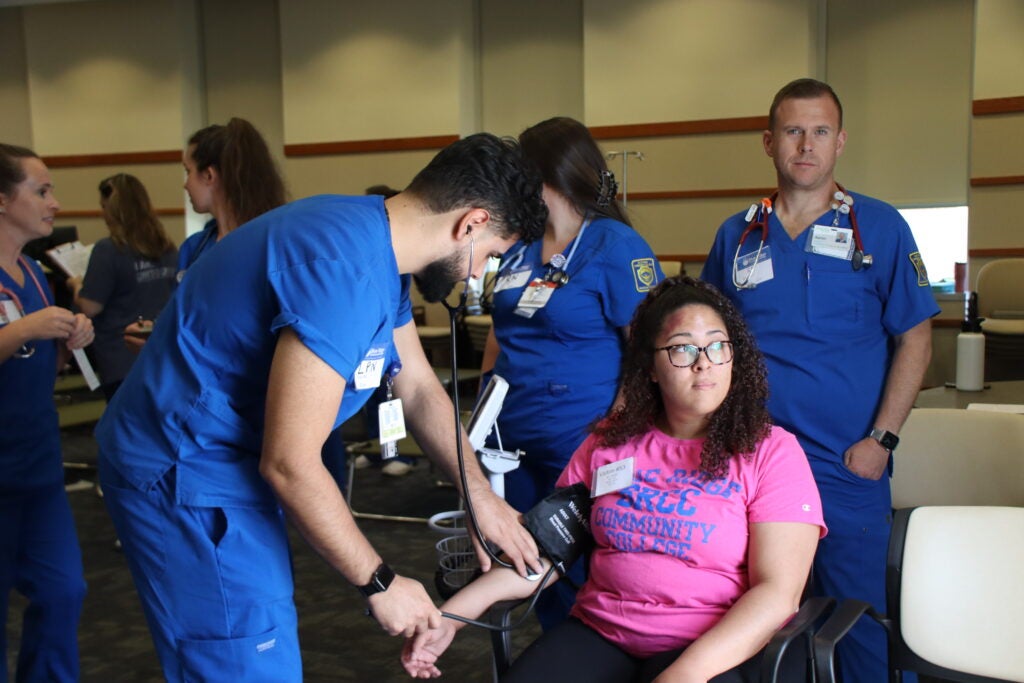
Careers
Nursing graduates of the Associate of Applied Science Degree (A.A.S.) take the National Council Licensure Examination to become a Registered Nurse (RN).
Evaluate your skills/abilities against the Essential Nursing Performance Standards to see if you are a good nursing candidate.
Nursing Program Overview
The A.A.S. curriculum is designed to prepare selected students to qualify as contributing members of a healthcare team, rendering direct patient care as beginning practitioners of nursing in a variety of health service organizations. Graduates will be eligible to take the National Council Licensure Examination (NCLEX) leading to licensure as a Registered Nurse (RN). Licensure is required in order to be employed as a registered nurse.
Nursing Program Admissions
The Nursing Program is a competitive-admissions credential designed to prepare students to sit for the Registered Nurse (RN) Licensure Exam. More information on Nursing Program Admissions can be found at the link below.
Nursing Program Resources and Information
PDFs require Acrobat Reader
- Estimated Costs 2024-2025 – PDF
- NCLEX Passage Rates
- Nursing Scholarships
- Attrition Rates
- Job Placement Rates
Accreditation
The nursing program is approved by the Virginia Board of Nursing
Perimeter Center
9960 Maryland Drive
Suite 300
Henrico, Virginia 23233-1463
Telephone 804-367-4515
Fax 804-527-4455.
Further, and pursuant to United States Department of Education (US DOE) regulation 34 CFR 668.43 (a) (5) (v), the BRCC Associate’s Degree in Nursing (ADN) program provides the following information for all prospective and current students:
The BRCC ADN program meets all Virginia Board of Nursing requirements for pre-licensure nursing education programs in the Commonwealth of Virginia. In addition, the BRCC ADN program meets all requirements for nationally recognized accreditation by the Accrediting Commission for Education in Nursing.
The associate degree nursing program at Blue Ridge Community College located in Weyers Cave, VA is accredited by the Accreditation Commission for Education in Nursing (ACEN)
3390 Peachtree Road NE
Suite 1400 Atlanta, GA 30326
(404) 975-5000
The most recent accreditation decision made by the ACEN Board of Commissioners for the associate degree nursing program is Continuing Accreditation.
The Commonwealth of Virginia participates with 32 other states in the National Council of State Boards of Nursing (NCSBN) National Licensing Compact (NLC) to allow nurses licensed in one state to provide nursing care across state lines in other compact states. The Uniform Licensing Requirements (ULRs) contain more details.
For more information, review the states currently in the NLC. Prospective and current students are strongly encouraged to evaluate all state requirements in jurisdictions where they intend to practice nursing.
BRCC has not determined if the ADN program meets the requirements of any other states.
Student Learning Outcomes for the Concept Based Curriculum
Students will be able to:
- Provide client centered care promoting therapeutic relationships, caring behaviors, and self-determination across the lifespan for diverse populations.
- Practice safe nursing care that minimizes risk of harm across systems and client populations.
- Demonstrate nursing judgment through the use of clinical reasoning, the nursing process, and evidence-based practice in the provision of safe, quality care.
- Practice professional behaviors that encompass the legal/ethical framework while incorporating self-reflection, leadership and a commitment to recognize the value of lifelong learning.
- Manage client care through quality improvement processes, information technology, and fiscal responsibility to meet client needs and support organizational outcomes.
- Demonstrate principles of collaborative practice within the nursing and interdisciplinary teams fostering mutual respect and shared decision-making to achieve stated outcomes of care.
- Manage the appropriateness, accuracy, and client response to pharmacology principles for clients with complex conditions.